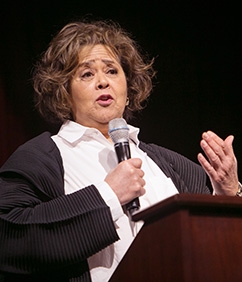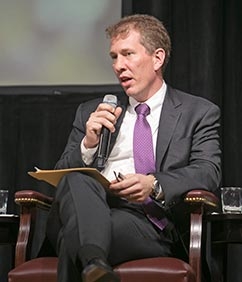Anna Deavere Smith receives the George Polk Career Award, and Dean Trevor Morrison comments on the relationship between truth and the law
New York University professors from a range of disciplines met at NYU Law to honor Professor Anna Deavere Smith, who received this year’s George Polk Career Award for Special Achievement in Journalism. The notion of the truth as something subjective and difficult to define was discussed throughout the event in the context of art, journalism, and the law as speakers attempted to define “truth” in respect to their areas of academic study. Representing the Law School was Dean Trevor Morrison, and other speakers included Allyson Green, dean of NYU Tisch School of the Arts, and Perri Klass, director of the NYU Arthur L. Carter Institute of Journalism.
In accepting her award, Smith shared an anecdote of something Johnnie Cochran told her while she was conducting research for her 1994 documentary-style play Twilight: Los Angeles, 1992. “There are three sides of every story,” Cochran said to her. “Yours, mine, and the truth.” Smith then described the ways the idea of truth took on a different meaning in her work as an actress and as a journalist. In journalism, she said, she thought of truth tellers as those who exposed wrongdoing, while truth in acting was more abstract.
Discussing truth in the law, Morrison remembered an article written by US federal judge Simon Rifkind in which he suggested that “in actual practice, the ascertainment of the truth is not necessarily the target of the trial, and that values other than truth frequently take precedence, and that indeed ‘courtroom truth’ is a unique species of the genus ‘truth.’”
Morrison used the example of certain confidential relationships, like that between a doctor and patient. “The law recognizes certain types of privileges,” he said. “If what we cared about was getting to thebottom of what really happened, and we cared about that more than anything else, we could compromise—at least in some circumstances—those privileges.”
Truth is crucial to people’s ability to participate in democracy, Morrison said, because democracy requires citizens to be able to determine what is true, which in turn depends on their access to information. “In a big way for me, today, when I think about the law and truth, I ask… ‘What’s the ability of the voter to gain access to the facts on the basis of which he or she can make a judgement about what’s true?’” Maintaining this kind of truth, he said, was more important to him than looking for objective truth in the courtroom.
Posted May 11, 2017



